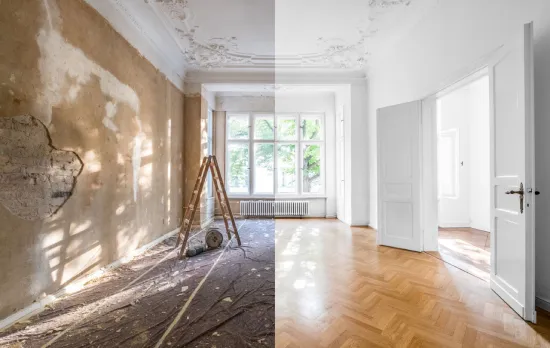Selling your apartment as-is means different things to different people. The most widely accepted definition is selling your apartment without any major improvements or repairs and selling the apartment in its existing condition. Whether things like a fresh coat of paint and decluttering/staging the apartment change the as-is status is subjective. The risk and process of selling an apartment as-is differ based on the condition of the apartment. Selling an apartment in good condition as-is is not the same as selling a distressed apartment as-is.
Why Sell Your NYC Apartment As-Is?
- You do not have the funds to renovate/repair the property and want to recoup as much of your original investment as you can and, ideally, make a profit over it. However, this situation still leaves room for a lot of no-cost and low-cost improvements.
- You do not have the time or motivation to renovate the apartment before selling.
- You want to unload the property as soon as possible. That may require you to lower your asking price, even for an as-is property.
- You are selling a distressed apartment that may require time and cost-intensive renovations that you cannot afford or are willing to spend. This may happen if you come into possession of an apartment that hasn’t been used for months/years (typically through an inheritance).
- A positive reason to sell your NYC apartment as-is is that there is nothing much to do. You may have an apartment in great condition through regular maintenance and upkeep or because it isn’t old enough to have sustained much wear and tear.
- Another reason to sell your apartment as-is could be that you believe some of its fundamental strengths, like location, size, amenities, or positive market factors, like a powerful seller’s market, may allow you to earn a good profit without investing time and effort in improving the apartment.
Pros and Cons of Selling Your Apartment As-Is
Pros
- No upfront selling cost. When you are selling an apartment as-is, you may not have to invest any money in improving or staging the property. If you are working with an agent, that cost will be covered by the funds you receive after closing.
- Less time and effort consuming. If you are determined to sell your property as-is, you can list it the very next day and start meeting with potential buyers. You also won’t have to invest any effort into the pre-listing preparations.
Cons
- You do not realize the full potential of your asset. When you are selling as-is, you might be sellingfor a relatively low price that your apartment would fetch in top condition anyway. But if the market is weak and potential buyers identify more issues with the property when they visit, they might negotiate with you to lower your price even more.
- It may take more time to unload, especially in a buyer’s market. The as-is tag can shrink the potential buyer pool, and bargain hunters that seek your as-is apartment may get stuck at a price point you are not comfortable selling on. This may not be as much of a con in a seller’s market when buyers might focus on the apartment’s fundamental strengths and evaluate the property for what it might become (with the right renovations) instead of what it is in its current condition.
Strategies For Selling An NYC Apartment As-Is
Favorable Market
If you have the luxury of time, try selling an apartment as-is when the market is in your favor. If the prices are climbing rapidly and there are a lot of buyers in the market because of low-interest rates, you may be able to sell your apartment as-is without taking on a significant shave, especially if it has no major flaws.
Be Transparent Without Using The Words “As-Is”
Selling as-is means that you are not interested in making any improvements before putting your apartment on the market or even if any problems are revealed after the inspection. You can communicate that without using the as-is tag. Ideally, it should be communicated through the listing or at first contact so as not to misguide potential buyers. But simply removing this accurate tag from your listing can help get more potential buyers interested in your property, thus increasing your chances of selling at your asking price.
Write The Appropriate Listing
Even if your apartment is considered distressed, that doesn’t nullify its strengths, like a great location, good layout, a large area, building amenities, etc. Make sure all these strengths are present in the listing. It can help potential buyers determine if the apartment will be a good investment if they renovate it and the cost of renovation is equal to or less than what you are leaving out by selling it as is. If you have a relatively accurate idea of how much it would cost to renovate the apartment (You can ask for estimates from contractors) to get it into good shape, you may consider adding that in the listing (after consulting with your agent).
Closing Credit
If you do not want to lower the asking price by a significant degree, consider leaving closing credit for renovations and repairs. This may be necessary if you are selling a co-op as-is and your asking price is below what the co-op board considers a good price (and they would reject your buyers).
Price it Right
Getting an inspection before putting your apartment on the market as-is can give you a relatively good idea of how much it might go for. You should consider all the positive and negative factors in your price. Your apartment’s view, the location of the building, any original details that can be salvaged through a restoration, natural light, building amenities, etc., will be positive factors. The condition and age of the apartment and the high cost of renovation are negative factors to consider.
Small Improvements
Small improvements like a new coat of paint and decluttering can help your apartment make a good impression on buyers and make your listing more appealing compared to distressed as-is listings.
Honesty is a good policy when selling your apartment as-is, but it’s important to understand that there is a difference between highlighting your apartment’s flaws and disclosing them. The former will simply give more leverage to potential buyers, while the latter will help you negotiate in good faith.















